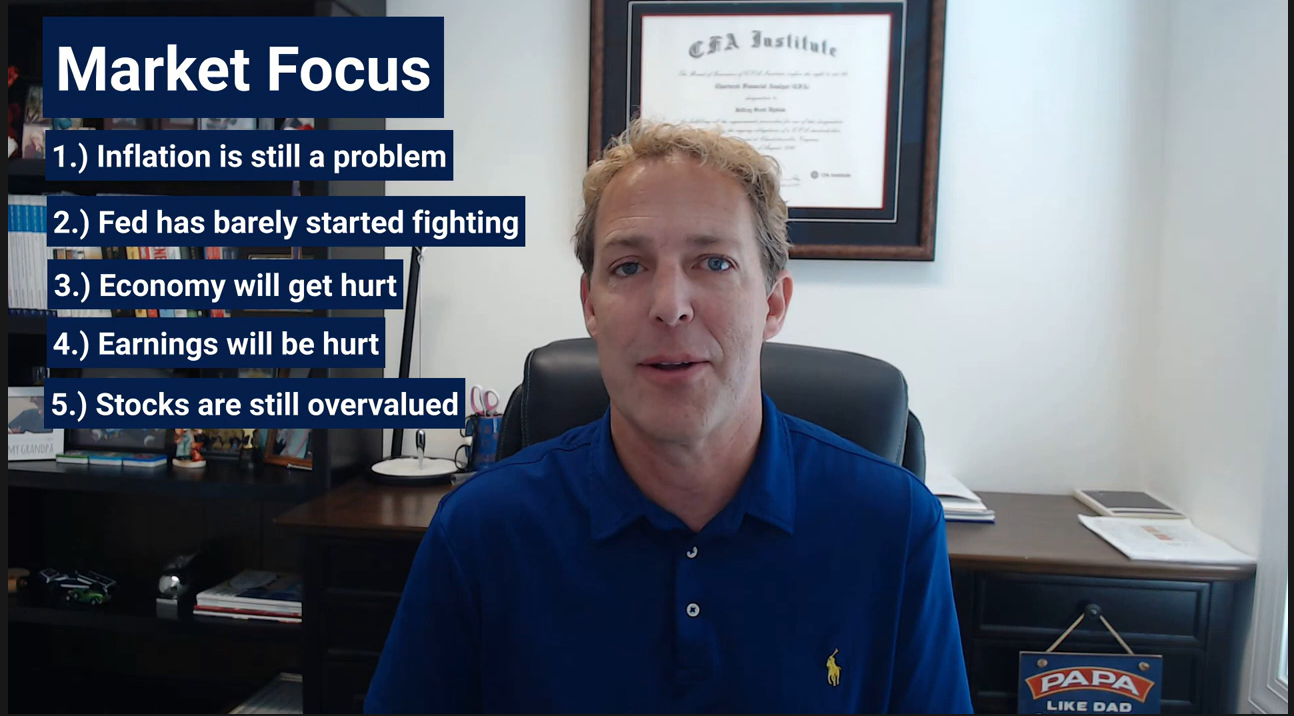Stocks are set to retest the lows from June. We'll hear a lot this week about a "breakdown" or if stocks hit new lows and then rally. I'm confident there will be plenty of "experts" calling it the "bottom". Stocks are down 16% since August 16 and 13% since Fed Chair Jerome Powell reminded everyone at Jackson Hole the Fed's top focus will be on reigning in inflation. He reiterated that last week after the Fed raised interest rates 3/4% for the third consecutive meeting.
With stocks down so much, we should expect a bounce. As I've been warning since June, a bear market will bring plenty of big rallies which leads too many people to declare "the worst is over." It is critically important for advisors and investors alike to focus on the bigger picture, which means ignoring both the fast drop the last 4 weeks as well as the inevitable bounce. There is a lot of noise out there, which will only serve to make decision making that much more difficult. In June we posted a short video with our Bear Market Tips. I'd encourage everyone to take another look. The only thing that has changed since then has been the Fed being more forceful in their message about fighting inflation.
As I said in the video – we've grown used to the Fed being there to "stimulate" during bear markets (even though it didn't prevent huge losses and recessions.) Unless you were investing in the 1970s, this is the first time in your investing life where the Fed is RAISING interest rates during a bear market. This means you absolutely cannot rely on your "hunches" or "experience". This is yet another reason we follow our Behavioral Approach. At the core is removing subjectivity from the decision making process. Let data and history tell the story, not our brains.
We posted a video last week to help navigate this bear. In case you missed it you can watch it below.

You can also check out our Bear Market Tips here:

1.) Don't Panic
2.) Ignore the Media
3.) Be Patient
One of the things I've reminded everyone who will listen is this – buying the dips works — until it doesn't. During the "everything bubble" post Global Financial Crisis where the Fed stimulated with way too much easy money for way too long (and then quintupled down in 2020) with hindsight we've seen how profitable it can be to jump in and buy the dips (which of course assumes you have money on the sidelines, which is not that easy if you also follow the "buy & hold" approach advocated by most "experts".)

The problem is the bubble has created an unstable environment. Whenever that happens the excesses need to be removed. This typically happens faster than most people believe is possible and often goes much longer and lower than most people think can happen. That's just how markets work and why it is imperative to rely on data rather than our opinions.

I don't want to be an alarmist. I'm very bullish on stocks over the long-term and believe they are the single best place to invest your money if you have a 20 year or longer time horizon. Think of all the terrible economic events which have occurred the last 100 years and yet stocks have averaged 8-10% per year with no losing 20 year periods.
That said there are STRUCTURAL things that must be dealt with before we can start the next strong bull market. Some of them, in no particular order:
- Trade imbalance – we learned during COVID we cannot rely on one region to supply everything. Shifting this imbalance takes time and is inflationary.
- Debt – this isn't about politics. The party in control never cares about debt, but instead "stimulating" the economy. I wrote about this last year (see Debt Ceiling Hypocrisy). Debt is a drag on growth (because we have to use increasing amounts of money to pay back the debt.)
- Higher Interest Rates – interest rates are now back to levels we last saw BEFORE the Global Financial Crisis. For over 12 years we've grown accustomed to artificially low interest rates. That is changing rapidly and there are going to be companies, individuals, and municipalities who simply cannot afford higher interest rates. They will either be forced to default or forced to slash services/jobs.
- Global Debt / Dollar Strength – it's not just the US. I've used the analogy the US is the "best looking horse in the glue factory." The whole world has relied on too much debt. The whole world wants to devalue their currency to make their goods more attractive in other countries (and make it easier to pay back their debt.) Despite high inflation, the dollar has surged this year primarily because it is seen as a safe haven. Traders are already hearing rumblings of some liquidity problems related to interest rate/currency derivatives contracts.
- Economic Imbalances – I called the economy the "K-shaped" economy back in 2020. Essentially those able to work from laptops not only didn't lose their jobs, but in many cases made more money, yet they also received three rounds of stimulus checks. Those who didn't, did not receive enough money to compensate them for the lost wages. Inflation hurts those living paycheck to paycheck the most and the sad irony is the Fed's main tool to fight inflation – raising interest rates – also hurts the same people. There are no easy answers, but without a middle class no economy can thrive.
- Demographic Imbalances – we have too many people leaving the workforce and not enough replacing them. This becomes a drag on growth as well as a strain on governments to support them.
- Pension Problems – I've long been a critic of how the US accounts for pension liabilities (essentially the manager of the pension gets to estimate how much they think the pension will earn on its investments. The higher the estimated returns, the lower the liabilities (money needed to put into the pension.) In the rest of the developed world, the estimated returns match the INTEREST RATES in that country, which is a much more conservative estimate. If we were to use the global accounting method, I estimate just 20-30% of all US pensions would be considered fully funded. With stocks down close to 20% this year and bonds down more than 10%, the losses in pension portfolios are going to be huge, especially when you combine that with estimated losses in the private equity portfolios too many of these plans piled into the last couple of years.
- Social Cycle / Politics – I've discussed this for over a decade. Based on history and demographics, the 2020s are set-up to be the end of the "crisis" portion of the cycle, which always leads to great economic/social/political strife. The mid-term elections are likely to be heated and full of hyperbole from both sides.
I think I'll stop there. Please understand these are all long-term issues that must be dealt with, but also issues I fully believe we will deal with. On the other side of this we should be looking at another tremendous bull run (bubble). The key is getting to the other side.
I'm frequently asked by people what they should be doing with their investments. My answer is always the same — it depends. We created our Behavioral Portfolio Approach to help make those decisions.

The foundation of this approach is a COMPLETE financial plan. If you don't have one, we can help you get one (for free). From there we look at the cash flow strategy (both in and out). Then we need to look at the types of investment accounts and what those individual objectives need to be. Finally we can discuss how/where/when to invest. Grouped into all of this is whether or not you have the personality to be fully invested in stocks. Not everyone does, which is fine.
What we see too often is people who have far too much money invested in stocks simply because they'd been going up or somebody told them they should. Please do not get sucked into the noise/emotions of this bear market. Stocks are going to rally and they are probably going to go even lower than they are today. We have a plan to handle both (and everything in between.) Do you?
Market Charts
I've already gone way too long today, but here's a quick look at the market charts I look at every day.
The Fed started this bear market the first week of January. Market participants are still laser focused on them. Short-term, 3532 is the intra-day low for the S&P 500. We could see a break below that followed by a big "buy the dip" rally.

Please ignore the inevitable rally. From a fundamental perspective, stocks are nowhere close to being "undervalued". In fact, after a 20% drop in stocks, the S&P 500 is now at an AVERAGE valuation. Remember, the way we get to an average is time spent above and below that average. We go above the average when growth is strong and below it when growth is weak. Growth is likely to be weak.

If you are a "bottom fisher", I wouldn't get excited until we were around 12-15x expected earnings. The problem is the expected earnings continue to be reduced. Wall Street is stubbornly holding onto their predictions of a strong rebound in 2023, yet they keep pushing when that rebound will come. Right now, they are expecting flat growth through next June before a huge rebound to bring the growth in 2023 to 15%.
Does anybody really believe we're going to see 15% growth in 2023? If you're buying stocks today, you better believe that. Otherwise, we're going to see estimates continue to be reduced, which will mean even lower stock prices.
The move in interest rates is astounding. The bond market appeared to breath a sigh of relief when the Fed finally got around to raising rates by 3/4% in June. However, following the July Fed meeting when the markets took the messaging from the Fed to be too weak in terms of fighting inflation, we've seen the bond market take aggressive action to raise long-term interest rates.

I pointed out at the FPA Symposium last week that everybody in the room, including the longest tenured CFP in the audience who started in 1982 that nobody has been in an environment where interest rates weren't trending down. This is NEW, which means you cannot rely on your own experience. I also pointed out above there are some potential financial failures related to derivatives that may come into play in the coming months given how fast interest rates (and the dollar) have moved since August.
Please be careful! There are good times to invest and not so good times. There will be times where it's easy and times where it's not so easy. There's no need to be a hero and try to pile into stocks at the bottom (or ride the market all the way down if you're financial plan says you cannot afford additional losses).
Remember, at SEM we have a plan. Here is the ongoing recap of when our various models made adjustments to our portfolios. It's not perfect, but the key is our diversified approach allows clients to stick to their plan.

Follow us on TikTok, Instagram, or Facebook
We continue to post a lot of content to our new social media channels in an attempt to reach a wider audience with our common sense financial literacy. One of the posts last week was more meant for financial advisors. I'm paid to watch CNBC, Bloomberg, and other financial media organizations. I've done this for over 25 years and have a pretty good filter. When I first started with SEM, Rick said there was one person he always takes the TV off of mute for. I've done the same. For 25 years Art Cashin has always given it straight. He doesn't look to make advertisers happy, or to get more "views". He simply tells us what he sees as somebody who has spent more than 50 years on the trading floor. Here are some of the highlights from last Friday:
@finance_nerd I always stop what I’m doing when he comes on. #CNBC #bearmarket2022 #stockmarket #liquidity #federalreserve #bankruptcy @cnbc ♬ original sound - finance_nerd
I also posted a short explanation as to why stocks are down so much in 2022 (which ties into my P/E discussion above).
@finance_nerd Here’s the math behind the drop in stock prices. #stockmarket #investing #financialliteracy #nerdtok #math #finance101 ♬ original sound - finance_nerd
We will continue to post on-going commentary and content throughout the week. You can follow us here: Instagram | TikTok | Facebook





